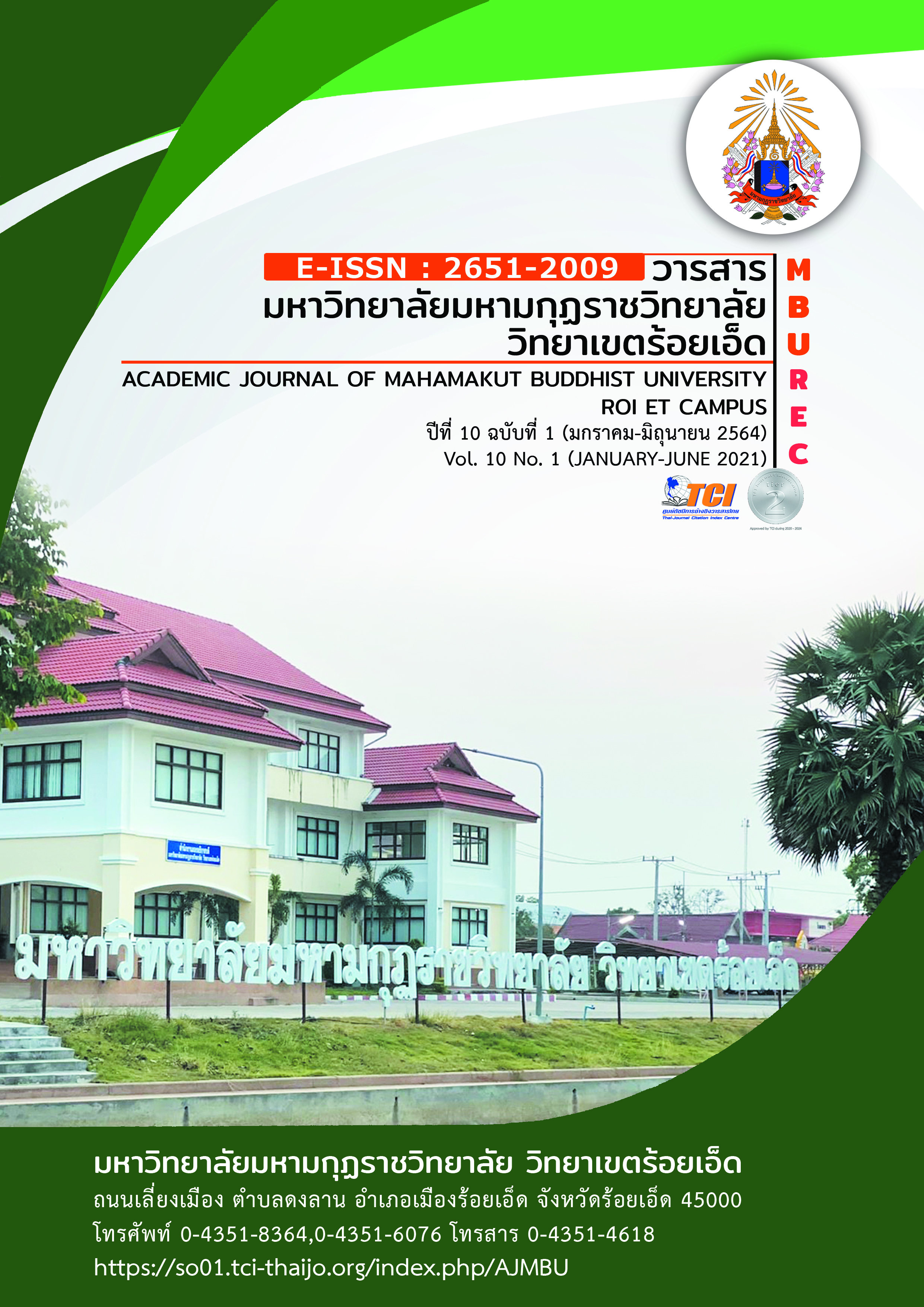Peaceful-Oriented Communication for Reduction of Hate Speech Abused by Thai Youth in the 21st Century
Main Article Content
Abstract
The objective of the research article were 1) to analyze the language tactics showing the violence of Facebook users in their comments 2) to analyze the social factors associated with the language tactics showing the violence of Facebook users in their comments and 3) to create innovations by the use of peaceful communication with the principles of Principles of Proverbs, Principles of virtues conducive to growth, and Four Rddhippada to reduce the violence of language usage of Thai in the 21st century. It is a quantitative research. The research instruments were questionnaires. The statistics used in the research were percentage, mean and standard deviation.
The results were as follows : 1. Language strategies contains words for verbal abuse in the news before the election, the news after the election, and social disparity news were classified into 5 groups as follows : 1) words for verbal abuse on political group, 2) words for verbal abuse on occupation and specialized interest groups, 3) words for verbal abuse on non-human group, 4) words for verbal abuse on religion, 5) words for verbal abuse on regional ethnicity 2. Social factors associated with language strategies were: 1) the need for an identity on social media, 2) the need for recognition or prominence on social media, 3) Innovations that use peaceful communication to reduce the violence of language usage of Thai the 21st century using the 7-step rainbow model: 1) Growth concept, 2) Critical thinking skills, 3) Communication skills in conflict situations, 4) Social skills, 5) Four Rddhippada, 6) Principles of virtues conducive to growth, 7) Principles of Proverbs.
Article Details
References
นิพัทธ ผึ้งไผ่งาม. (2557). การใช้เหตุผลวิบัติในการโต้แย้งบนเว็บบอร์ด. วิทยานิพนธ์การศึกษามหาบัณฑิต สาขาวิชาภาษาศาสตร์. มหาวิทยาลัยศรีนครินทรวิโรฒ.
ประคอง นิมมานเหมินท์ และคณะ. (2552). บรรทัดฐานภาษาไทย เล่ม 4 : วัฒนธรรมการใช้ภาษาไทย. กรุงเทพมหานคร : สถาบันภาษาไทย สำนักวิชาการและมาตรฐานการศึกษา สำนักงานคณะกรรมการการศึกษาขั้นพื้นฐาน กระทรวงศึกษาธิการ.
พิรงรอง รามสูต. (2558). ประทุษวาจากับโลกออนไลน์. กรุงเทพมหานคร : คบไฟ.
ภัทรวดี แก้วเทศ. (2558). ความคิดเห็นต่อความรุนแรงเชิงวัฒนธรรมของนักเรียน ระดับมัธยมศึกษาตอนต้น กรณีศึกษา เนื้อหาความรุนแรงบนสื่อออนไลน์. วิทยานิพนธ์ศิลปศาสตรมหาบัณฑิต สาขาวิชาการบริหารงานวัฒนธรรม. มหาวิทยาลัยธรรมศาสตร์.
สกุลศรี ศรีสารคาม. (2560). สื่อใหม่กับกระบวนการเปลี่ยนแปลงกระบวนการสื่อข่าว. วารสารมหาวิทยาลัยนครพนม. 12(1). 236-249.
สำราญ สมพงษ์. (2558). กระบวนการสื่อสารออนไลน์ผ่านเฟซบุ๊กเพื่อส่งเสริมสันติภาพของพระสงฆ์โดยพุทธสันติวิธี. วารสารสันติศึกษาปริทรรศน์ มจร. 9(1). 276-289.
สิริภิญญ์ อินทรประเสริฐ. (2557). ความสัมพันธ์ระหว่างอิทธิพลของสื่อกับพฤติกรรมความรุนแรงของเด็กและเยาวชนในกรุงเทพมหานคร. วารสารวิจัย มสด สาขามนุษยศาสตร์และสังคมศาสตร์. 10(3). 17-36.
Machin,D. and Mayr, A. (2012). How to do critical discourse analysis: a multimodal introduction. Los Angeles : SAGE.
Newman. (2009). Enhancing Phosphorus phytoremedation potential of two warm-season perennial grasses with nitrogen fertilization. Agron J. 101(6). 1345-1351.


